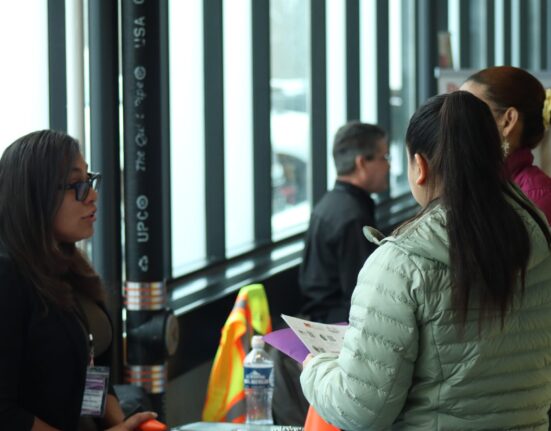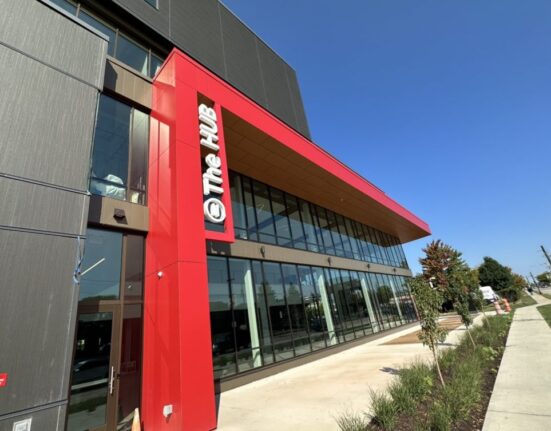
Kikkoman Foods, the Japanese soy sauce producer, celebrated 50 years of producing in Wisconsin Friday by donating $5 million to the state’s two largest universities to support research to help protect the resources that drew the company to the state in the first place: agriculture and water.
At an event Friday, chairman and honorary CEO Yuzaburo Mogi announced that the company would donate $3 million to the University of Wisconsin-Madison’s Wisconsin Integrated Cropping System Trial (WICST) and Grassland 2.0, and $2 million to help build the Maggie Sue, a freshwater research vessel at UW-Milwaukee.
WICST is a long-term field experiment at Arlington Agricultural Research Station, where researchers manage nine cropping systems that are representative of much of Wisconsin’s agricultural landscape, according to a UW press release. They explore how alternative approaches to crop and livestock production affect yields, soil carbon, nutrient dynamics, greenhouse gas emissions and biodiversity. WICST is unique among long-term agroecological experiments in both its scale and breadth, with organic and non-organic commodity-grain, dairy-forage rotations, rotationally grazed livestock on pasture and prairie, and grasslands harvested for second-generation biofuels.
“The value of the program for understanding agroecosystem sustainability increases over time, but the ability to support it with grant funds becomes more difficult,” WICST director Randy Jackson said in a statement. “Kikkoman support helps ensure the integrity of our 34-year-old cropping systems experiment into the future.”
Grassland 2.0 is a research, engagement and teaching project with the goal of understanding how cropping systems can be transformed to function more like the original prairie. This work includes exploring how cropping systems such as soybeans, wheat, maize, alfalfa and grasslands can be configured on landscapes to improve soil health, clean waters, reduce flooding and enhance biodiversity, all while providing opportunities for young and new farmers.
“The support we are receiving from Kikkoman for Grassland 2.0 will help us grow the project into a movement that’s focused on local community processes of place-making, which are geared toward helping communities be more sustainable and resilient in the face of 21st century challenges,” Jackson said in a statement.
The Maggi Sue will be “the most advanced research vessel ever designed for the Great Lakes,” according to a press release from UW-Milwaukee. The vessel will be a fully functional 24-7 scientific platform with precision navigation; GPS controlled dynamic positioning; fully equipped modern laboratories with environmental chambers to mimic any lake environment; modular “pod” labs that can be lifted onto her decks when specialized equipment is required; and sensors capable of collecting real-time data while in transit. Overnight accommodations for 18 scientists and crew will allow for long-range missions and interdisciplinary teams of scientists dedicated to real-time collaboration and discovery.
Beyond UWM, the Maggi Sue will serve as a key research and instructional asset for the Freshwater Collaborative of Wisconsin – a collective of all 13 UW System campuses and their water programs – as well as the Cooperative Institute for Great Lakes Research, which is a partnership of a dozen research universities across the Great Lakes basin and the National Oceanographic and Atmospheric Administration. The vessel will also serve as a floating classroom for graduate, undergraduate and K-12 students, as well as teachers, promoting greater understanding of water sciences while encouraging interest in science, technology, engineering and math.

In honor of the donation, one level of the vessel will be named the Kikkoman Freshwater Research Deck. The Kikkoman donation brings the project closer to its $20 million fundraising goal.“I am so grateful to our friends at the Kikkoman Foods Foundation for their generosity and vision,” School of Freshwater Sciences Dean Rebecca Klaper said in a statement. “This gift will bring us one step closer to constructing our innovative research vessel, with which we can continue to learn about and protect the important ecosystem of the Great Lakes and our supply of clean, fresh water.”
“The time-honored traditional brewing process for soy sauce uses just four simple ingredients: water, soybeans, wheat, and salt,” Kikomann chairman Mogi said in a statement. “Through the donations, we’re providing meaningful benefit to the region, and world, by helping to ensure the sustainability of agricultural systems and natural resources that contribute to producing soy sauce into the future.”
Kikkoman traces its roots back more than 300 years, expanding into North America in 1973. The company chose Walworth, Wisconsin, due to its central location in the country, access to agricultural land and groundwater, and hardworking labor force.






